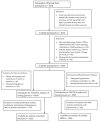Egg Intake Is Associated with Lower Risks of Impaired Fasting Glucose and High Blood Pressure in Framingham Offspring Study Adults
- PMID: 36771213
- PMCID: PMC9920838
- DOI: 10.3390/nu15030507
Egg Intake Is Associated with Lower Risks of Impaired Fasting Glucose and High Blood Pressure in Framingham Offspring Study Adults
Abstract
The association between egg consumption and cardiometabolic risk factors such as high blood pressure (HBP) and impaired fasting glucose (IFG) or type 2 diabetes (T2D) is still under debate. This study examines the association between egg consumption and these outcomes among 2349 30-64 year-old adults in the prospective Framingham Offspring Study. Diet was assessed using three-day dietary records. Potential confounders retained in the final models included age, sex, body mass index, and other dietary factors. The analysis of covariance and Cox proportional hazard's models were used to assess the relevant continuous (i.e., FG, SBP, DBP) and categorical (i.e., T2D, HBP) outcomes. Consuming ≥5 eggs per week was associated with lower mean FG (p = 0.0004) and SBP (p = 0.0284) after four years of follow-up. Higher egg intakes led to lower risks of developing IFG or T2D (HR: 0.72; 95% CI: 0.51-1.03) and high blood pressure (HBP) (HR: 0.68; 0.50-0.93). The beneficial effects of egg consumption were stronger in combination with other healthy dietary patterns. This study found that regular egg consumption as part of a healthy diet had long-term beneficial effects on blood pressure and glucose metabolism and lowered the long-term risks of high blood pressure and diabetes.
Keywords: blood pressure; diabetes; diet patterns; eggs; fasting glucose; high blood pressure; prospective study.
Conflict of interest statement
The authors declare that they have no conflicts of interest. The funders of this study had no role in the design of the study; in the collection, analyses, or interpretation of data; in writing of the manuscript, and in the decision to publish the results.
Similar articles
-
Egg consumption and risk of incident type 2 diabetes in men: the Kuopio Ischaemic Heart Disease Risk Factor Study.Am J Clin Nutr. 2015 May;101(5):1088-96. doi: 10.3945/ajcn.114.104109. Epub 2015 Apr 1. Am J Clin Nutr. 2015. PMID: 25832339
-
Diets higher in protein predict lower high blood pressure risk in Framingham Offspring Study adults.Am J Hypertens. 2015 Mar;28(3):372-9. doi: 10.1093/ajh/hpu157. Epub 2014 Sep 6. Am J Hypertens. 2015. PMID: 25194158 Free PMC article.
-
Association between egg consumption and cardiovascular disease events, diabetes and all-cause mortality.Eur J Nutr. 2018 Dec;57(8):2943-2952. doi: 10.1007/s00394-017-1566-0. Epub 2017 Nov 2. Eur J Nutr. 2018. PMID: 29098427 Free PMC article.
-
Egg consumption, cardiovascular diseases and type 2 diabetes.Eur J Clin Nutr. 2018 Jan;72(1):44-56. doi: 10.1038/ejcn.2017.153. Epub 2017 Sep 27. Eur J Clin Nutr. 2018. PMID: 28952608 Review.
-
Dietary acid load, blood pressure, fasting blood sugar and biomarkers of insulin resistance among adults: Findings from an updated systematic review and meta-analysis.Int J Clin Pract. 2020 Apr;74(4):e13471. doi: 10.1111/ijcp.13471. Epub 2020 Jan 7. Int J Clin Pract. 2020. PMID: 31884719
Cited by
-
Eggs and a Fiber-Rich Diet Are Beneficially Associated with Lipid Levels in Framingham Offspring Study Adults.Curr Dev Nutr. 2024 Feb 22;8(3):102062. doi: 10.1016/j.cdnut.2023.102062. eCollection 2024 Mar. Curr Dev Nutr. 2024. PMID: 38500805 Free PMC article.
-
Probiotics improve eggshell quality via regulating microbial composition in the uterine and cecum.Poult Sci. 2025 Mar;104(3):104849. doi: 10.1016/j.psj.2025.104849. Epub 2025 Jan 23. Poult Sci. 2025. PMID: 39874785 Free PMC article.
-
Eggs, Dietary Choline, and Nonalcoholic Fatty Liver Disease in the Framingham Heart Study.J Nutr. 2025 Mar;155(3):923-935. doi: 10.1016/j.tjnut.2024.10.026. Epub 2024 Oct 16. J Nutr. 2025. PMID: 39424072 Free PMC article.
References
-
- National Center for Health Statistics. Heron M. Deaths: Leading Causes for 2018. Volume 70. National Center for Health Statistics; Hyattsville, MD, USA: 2021. pp. 1–114. - PubMed
-
- Drouin-Chartier J.-P., Chen S., Li Y., Schwab A.L., Stampfer M.J., Sacks F.M., Rosner B., Willett W.C., Hu F.B., Bhupathiraju S.N. Egg Consumption and Risk of Cardiovascular Disease: Three Large Prospective US Cohort Studies, Systematic Review, and Updated Meta-Analysis. BMJ. 2020;368:m513. doi: 10.1136/bmj.m513. - DOI - PMC - PubMed
-
- U.S. Department of Health and Human Services and U.S. Department of Agriculture . 2015–2020 Dietary Guidelines for Americans. 8th ed. U.S. Department of Health and Human Services and U.S. Department of Agriculture; Washington, DC, USA: 2015.
-
- Zhong V.W., Van Horn L., Cornelis M.C., Wilkins J.T., Ning H., Carnethon M.R., Greenland P., Mentz R.J., Tucker K.L., Zhao L., et al. Associations of Dietary Cholesterol or Egg Consumption With Incident Cardiovascular Disease and Mortality. JAMA. 2019;321:1081–1095. doi: 10.1001/jama.2019.1572. - DOI - PMC - PubMed
MeSH terms
Substances
Grants and funding
LinkOut - more resources
Full Text Sources
Medical
Miscellaneous


